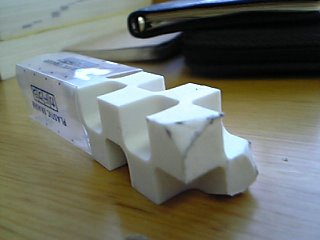
Another year comes hurtling...






Water Boarding: The prisoner is bound to an inclined board, feet raised and head slightly below the feet. Cellophane is wrapped over the prisoner's face and water is poured over him. Unavoidably, the gag reflex kicks in and a terrifying fear of drowning leads to almost instant pleas to bring the treatment to a halt.Anyway, the really basic thing I don't get is the insistent rhetoric which drums away as a justification for these violations of the normal rules of war and of human rights. This discourse has it that we are fighting an exceptional and unprecedented war in which the merest scrap of information about the enemy's plans might save thousands of lives. It seems a powerful line but, leaving aside the observation that torture is a systemic disease that has always threatened to corrupt and degrade intelligence gathering agencies, destroying their ability to provide accurate information to leaders, the really basic question I need answering is this:
According to the sources, CIA officers who subjected themselves to the water boarding technique lasted an average of 14 seconds before caving in. They said al Qaeda's toughest prisoner, Khalid Sheik Mohammed, won the admiration of interrogators when he was able to last between two and two-and-a-half minutes before begging to confess. [source]








Episode 1 December 5 2005: In which Ricky, Steve and Karl discuss the pros and cons of technological invention, leading on to Karl's Malthusian concerns and a possible solution. There's a digression into the extra sensory perception of early hominids. Oh, and some Monkey News of course. Plus strange tales about lethal drinking vessels and stately homes.An original move for a newspaper. And clever. They will get thousands of subscribers and begin to establish themselves as a player in a market which the established broadcasters are treating very circumspectly.





Kaku: Think of soap bubbles. We live on the surface of an expanding soap bubble and if you jiggle a soap bubble sometimes it vibrates and splits in half and then you have two soap bubbles. So, one soap bubble buds of another or sprouts off another and this is called eternal inflation. And so of course we can't prove all these theories but the experimental data is coming in in the direction of inflation, which does support the idea of a multiverse: that is an ocean of bubbles, each bubble then fissioning off and creating more bubbles and so we have a Genesis taking place in an eternal Nirvana.


Kaku: There is something called dark matter out there. We now realise that dark matter is about 10 times more plentiful than ordinary matter except dark matter is invisible ... There are two theories as to dark matter, both of them coming from something called string theory which is what I do for a living ... One is that dark matter is shadow matter just like the invisible man: gravity from another universe. The other theory is that dark matter could be made out of 'sparticles', super particles; that is higher octaves of the super string. Now, we believe, though we can't yet prove, that all matter we see around us is nothing but musical notes, musical notes on tiny tiny little vibrating strings. So, the laws of physics are the laws of harmony and when the strings bump into each other they create chemistry, so chemistry would be the melodies played out on these strings. The universe would be a symphony of strings and the Mind of God, that Einstein eloquently wrote about in his memoirs, the Mind of God would be cosmic music resonating not through ordinary space but through hyper space, perhaps 11 dimensional hyperspace. And so the other theory is that dark matter is nothing but the next octave of these vibrating strings. So, both interpretations of dark matter require the introduction of multiple universes.I'm so glad the interviewer said that.
Interviewer: Ok, that makes... Ha, ha... I don't have a clue what any of that means but I ...
Kaku: I can try again ...
Interviewer: No, no, no. You have.... I think that's ... I think that for someone of my scientific knowledge... I think that is about as good as it is going to get.






The Ridings School in Halifax has been given notice to improve after Ofsted inspectors said it was "performing less well than could be expected". The report said pupils were disruptive and capable of achieving more, and that teaching quality was "variable".But it praised the new head teacher and leadership team, saying they had made good plans to raise standards.Well, as the person who broke this story, I must say I'm not surprised at all that the Ridings school is inadequate "again". The plain fact is that it always has been inadequate and always will be. All this talk about great leadership, while no doubt true, has completely missed the point.

"Down with Japanese Imperialism!"
The ubiquitous slogan, its eight characters reading 'Datou Nippon teikokushugi!' in Japanese, greeted Japan's troops and civilians wherever they moved in China. Although this slogan and others like it, painted on countless walls, clearly and loudly expressed Chinese outrage and protest, Japanese correspondents and other writers reported them freely, seldom adding any comment because none was needed. The charge of imperialism struck most Japanese as absurd, merely demonstrating how ignorant and misled the Chinese were concerning Japanese actions and motivations. The charge contradicted the official narrative, that of Japan's benevolence, and could thus be silently dismissed.
Although the horrendous war unleased by Japan against China seemed to be a clear-cut manifestation of imperialism at its most vicious, Japanese statesmen, soldiers and sundry commentators did not see it that way at all. Japan's mission, they publicly insisted, was not a quest for wealth or power, but rather a moral crusade for freedom, peace, and justice. Goodness was at work, not greed. As a Japanese editorial of the late 1930s phrased it, "Our responsibility is not conquest of the world; it is the emancipation of the world".






Amazon.com and Google are both developing systems to allow consumers to purchase online access to any page, section or chapter of a book.More:
[Readers will be able to] buy and download parts of individual books for their own use through their computers rather than trek to a store or receive them by mail. Consumers could purchase a single recipe from a cookbook, for example, or a chapter on rebuilding a car engine from a repair manual.The good old book is going to be pulled apart at its stitching! It's like being able to go to the library with a pair of scissors and chop out the encyclopedia entry on "Siberian Winter Pantyhose" and cart it home!

Life on Earth, and intelligent life on Earth, evolved as a result of the competition for scarce resources. The evolutionary psychology that developed during this struggle has left its mark on our characters, and left human beings subject to involuntary, instinctual drives to consume resources and to breed. It seems likely that intelligent life on other planets evolved subject to similar constraints, and as such pessimism about their long term viability is a justifiable position.Technological civilizations may usually or invariably destroy themselves (via nuclear war, biological warfare, grey goo, or in a Malthusian catastrophe after destroying their planet's ecosphere) before or shortly after developing radio or spaceflight technology. This general theme is explored in The Mote in God's Eye by Larry Niven and Jerry Pournelle, which has as its central premise a civilisation that overtaxes its resource base and cyclically self-destructs, but which tries to preserve its culture from one cycle to the next. It would be anthropocentric to suggest that humanity is immune to any of these fates. Therefore another view is that we ourselves do not exist long enough to encounter alien life. Indeed, there are probabilistic arguments which suggest that our end may occur sooner rather than later.This isn't just wild fantasy. To take just one possibility: not only has our technological capability been increasing exponentially over the past few centuries but so has our consumption of energy resources. These resources are limited. If it proves not to be possible to come up with some kind unlimited energy source and if we cannot get off this planet before the scarcity begins to really bite, in the fullness of galactic time we are going to find ourselves in a vicious fight for those resources, with unsustainably large populations and with political and social structures well adapted to creating massively destructive violence in such a situation. This is only a silly thought, but maybe the Iraq war is, if looked at from a very long term perspective, the first twitchings of something big.

